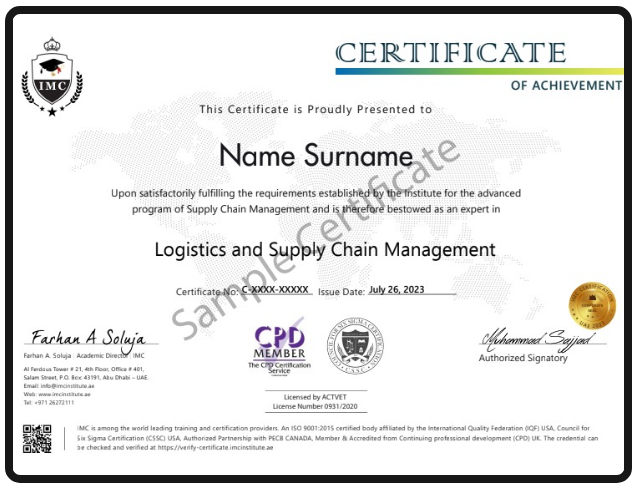- Quality Management
- Lean Six Sigma Yellow Belt
- Lean Six Sigma Green Belt
- Lean Six Sigma Black Belt
- Lean Six Sigma Master Black Belt
- Lean Six Sigma Combo (GB + BB)
- Lean Manufacturing Certification
- Total Quality Management Certification
- Certified Lean Practitioner
- IMC is Accredited by IASSC, IQF, CSSC, USA & CPD, UK.
- Self-Paced & LIVE Instructor Led Training with Free LMS Access.
- EMI Payment Option with No Cost.
POPULAR COURSES
Globally Accreditation
Multiple Training Modes
Flexible Payment Options
- Project Management
- PMP Certification Training
- Portfolio Management Professional (PfMP)
- Agile Scrum Master (ASM) Certification Training
- Agile and Scrum Foundation Certification Training
- Leading SAFe
- SAFe Scrum Master
- SAFe for Teams
- SAFe DevOps
- SAFe for Government
- Safe Product Owner/Product Manager
- SAFe Advanced Scrum Master
- Release Train Engineer
- Lean Portfolio Management
- Implementing SAFE
- SAFe for Architect
- Agile Product Management
- Agile Software Engineering
-
Accredited By
PMI on behalf of PMI.
- IMC is Accredited by IASSC, IQF, CSSC, USA & CPD, UK.
- Self-Paced & LIVE Instructor Led Training with Free LMS Access.
- EMI Payment Option with No Cost.
POPULAR COURSES
Globally Accreditation
Multiple Training Modes
Flexible Payment Options
- Logistics & Supply Chain
- Certified Supply Chain Foundation
- Certified Supply Chain Specialist
- Certified Supply Chain Expert
- IMC is Accredited by IASSC, IQF, CSSC, USA & CPD, UK.
- Self-Paced & LIVE Instructor Led Training with Free LMS Access.
- EMI Payment Option with No Cost.
POPULAR COURSES
Globally Accreditation
Multiple Training Modes
Flexible Payment Options
- Data Science & Business Analytics
- Data Science with R Certification Course
- Data Science with Python Course
- Machine Learning Certification Course
- Analytics for Retail Banks
- Microsoft Power BI Certification Training Course
- Tableau Certification Training Course
- DP 203: Data Engineering on Microsoft Azure
- Salesforce Certification Training Course
- IMC is Accredited by IASSC, IQF, CSSC, USA & CPD, UK.
- Self-Paced & LIVE Instructor Led Training with Free LMS Access.
- EMI Payment Option with No Cost.
POPULAR COURSES
Globally Accreditation
Multiple Training Modes
Flexible Payment Options
- AI & Machine Learning
- Machine Learning Certification Course
- IMC is Accredited by IASSC, IQF, CSSC, USA & CPD, UK.
- Self-Paced & LIVE Instructor Led Training with Free LMS Access.
- EMI Payment Option with No Cost.
POPULAR COURSES
Globally Accreditation
Multiple Training Modes
Flexible Payment Options
- Language Learning
- IELTS Express Proficiency
- IMC is Accredited by IASSC, IQF, CSSC, USA & CPD, UK.
- Self-Paced & LIVE Instructor Led Training with Free LMS Access.
- EMI Payment Option with No Cost.
POPULAR COURSES
Globally Accreditation
Multiple Training Modes
Flexible Payment Options
- Software Development
- DevOps Certification Training Course
- React JS Certification Training Course
- Selenium Certification Training Course
- Python Certification Course
- Kubernetes Certification Training Course: Administrator (CKA)
- ELK Stack Training & Certification
- Advanced Java Certification Training
- IMC is Accredited by IASSC, IQF, CSSC, USA & CPD, UK.
- Self-Paced & LIVE Instructor Led Training with Free LMS Access.
- EMI Payment Option with No Cost.
POPULAR COURSES
Globally Accreditation
Multiple Training Modes
Flexible Payment Options
- Cloud Computing
- AWS Solution Architect Certification Training
- Microsoft Azure Architect Certification Training Course (AZ-305)
- Snowflake Certification Training Course
- GCP Certification Training Course
- IMC is Accredited by IASSC, IQF, CSSC, USA & CPD, UK.
- Self-Paced & LIVE Instructor Led Training with Free LMS Access.
- EMI Payment Option with No Cost.
POPULAR COURSES
Globally Accreditation
Multiple Training Modes
Flexible Payment Options
- Cyber Security
- IMC is Accredited by IASSC, IQF, CSSC, USA & CPD, UK.
- Self-Paced & LIVE Instructor Led Training with Free LMS Access.
- EMI Payment Option with No Cost.
Globally Accreditation
Multiple Training Modes
Flexible Payment Options
- E-Learning Courses
- Analytics for Retail Banks
- Project and Infrastructure Financing
- Statistics Essentials for Analytics
- Software Testing Fundamentals Course
- SQL Essentials Training & Certification
- Python Scripting Certification Training
- PMI速 Agile Certified Practitioner Training
- PHP & MySQL with MVC Frameworks Certification Training
- Persistence with Hibernate Certification Training
- Advanced MS Excel 2016 Certification Training
- IMC is Accredited by IASSC, IQF, CSSC, USA & CPD, UK.
- Self-Paced & LIVE Instructor Led Training with Free LMS Access.
- EMI Payment Option with No Cost.
POPULAR COURSES
Globally Accreditation
Multiple Training Modes
Flexible Payment Options
- IT Services Management
- ITIL® 4 Foundation Certification
- IMC is Accredited by IASSC, IQF, CSSC, USA & CPD, UK.
- Self-Paced & LIVE Instructor Led Training with Free LMS Access.
- EMI Payment Option with No Cost.
POPULAR COURSES
Globally Accreditation
Multiple Training Modes
Flexible Payment Options
- ISO Certifications
- IMC is Accredited by IASSC, IQF, CSSC, USA & CPD, UK.
- Self-Paced & LIVE Instructor Led Training with Free LMS Access.
- EMI Payment Option with No Cost.
Globally Accreditation
Multiple Training Modes
Flexible Payment Options
- KFA
- Lean Six Sigma Yellow Belt (Arabic)
- Lean Six Sigma Green Belt (Arabic)
- Lean Six Sigma Black Belt (Arabic)
- Certified Professional of Advanced Quality Management of Managerial Work Process
- Certified Lean Management Practitioner
- IMC is Accredited by IASSC, IQF, CSSC, USA & CPD, UK.
- Self-Paced & LIVE Instructor Led Training with Free LMS Access.
- EMI Payment Option with No Cost.
POPULAR COURSES
Globally Accreditation
Multiple Training Modes
Flexible Payment Options
- Blockchain
- Cryptocurrency Trading Training
- IMC is Accredited by IASSC, IQF, CSSC, USA & CPD, UK.
- Self-Paced & LIVE Instructor Led Training with Free LMS Access.
- EMI Payment Option with No Cost.
POPULAR COURSES
Globally Accreditation
Multiple Training Modes
Flexible Payment Options
- Human Resource Management
- IMC is Accredited by IASSC, IQF, CSSC, USA & CPD, UK.
- Self-Paced & LIVE Instructor Led Training with Free LMS Access.
- EMI Payment Option with No Cost.
Globally Accreditation
Multiple Training Modes
Flexible Payment Options










